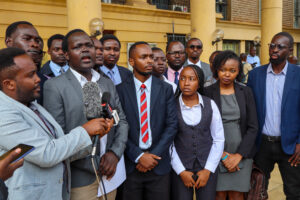21

Today 13th June 2025, the Kenya School of Law fraternity led by their president Samuel Mark gathered outside the Milimani Law court to condemn the brutality inflicted on one of their own by the police on June 12th 2025. They said that the immediate former president, Joshua Okayo, was brutally harassed while exercising his constitutional rights to picket and demonstrate peacefully. As a result, he was hospitalized.

The fraternity expressed their solidarity, stating that the state should cease its actions immediately. They emphasized their refusal to be silenced or relent, asserting that these actions were a violation of their constitutional rights. They condemned the police violence, questioning why peaceful protesters with placards should face such brutality. They stood firmly with Joshua Okayo and his family.
Samuel Mark, the president of the Kenya School of Law, conveyed the sadness felt by the student body regarding the assault on Okayo. He noted that the assault was carried out by a well-known police officer who had previously threatened Okayo during a peaceful protest. Mark urged the Director of Public Prosecutions (DPP) and the Independent Policing Oversight Authority (IPOA) to expedite the investigation into the assault, reaffirming that Okayo remained a member of their institution as he was undergoing pupillage.
Mark expressed the collective sorrow of the nation, mourning the loss of Albert Ojwang, who died in police custody. He highlighted the ongoing issue of injustice in the country, particularly the alarming occurrence of individuals dying while in police detention. The fraternity made several demands, including a call for IPOA to expedite its investigation into Uchieng’s death and to strengthen its operations. They insisted on the implementation of the National Coroners Service Act, which addresses the circumstances surrounding deaths in police custody.
Emphasizing their commitment to freedom of expression, Mark declared that it shall not be limited under any circumstances. He denounced the criminalization of free speech and the criticism of state officials, referencing a landmark ruling by Justice Evans Muita in 2016 that affirmed the importance of criticism in a democratic society. He urged public officials to accept criticism as part of their responsibilities and reminded the state that such criticism is enshrined in law.



